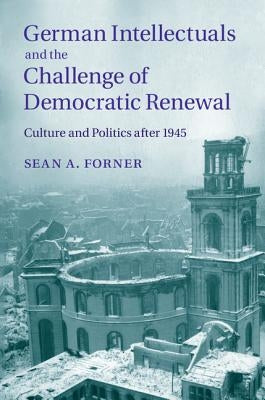1
/
of
1
Cambridge University Press
German Intellectuals and the Challenge of Democratic Renewal: Culture and Politics After 1945
German Intellectuals and the Challenge of Democratic Renewal: Culture and Politics After 1945
Regular price
$198.87 USD
Regular price
Sale price
$198.87 USD
Shipping calculated at checkout.
Quantity
Couldn't load pickup availability
This book examines how democracy was rethought in Germany in the wake of National Socialism, the Second World War, and the Holocaust. Focusing on a loose network of public intellectuals in the immediate postwar years, Sean Forner traces their attempts to reckon with the experience of Nazism and scour Germany's ambivalent political and cultural traditions for materials with which to build a better future. In doing so, he reveals, they formulated an internally variegated but distinctly participatory vision of democratic renewal - a paradoxical counter-elitism of intellectual elites. Although their projects ran aground on internal tensions and on the Cold War, their commitments fueled critique and dissent in the two postwar Germanys during the 1950s and thereafter. The book uncovers a conception of political participation that went beyond the limited possibilities of the Cold War era and influenced the political struggles of later decades in both East and West.
Author: Sean A. Forner
Publisher: Cambridge University Press
Published: 10/23/2014
Pages: 396
Binding Type: Hardcover
Weight: 1.70lbs
Size: 9.10h x 6.10w x 1.10d
ISBN: 9781107049574
Review Citation(s):
Choice 04/01/2015 pg. 1393
Author: Sean A. Forner
Publisher: Cambridge University Press
Published: 10/23/2014
Pages: 396
Binding Type: Hardcover
Weight: 1.70lbs
Size: 9.10h x 6.10w x 1.10d
ISBN: 9781107049574
Review Citation(s):
Choice 04/01/2015 pg. 1393
About the Author
Forner, Sean A.: - Sean A. Forner is a historian of twentieth-century Europe and Germany interested in the intersections of intellectual history and the history of political culture. His primary focus is on post-war ideas and practices of democracy, especially in moments when debate and experimentation intensified (for example, around 1945, 1956, 1968 and 1989). He also has long-standing interests in memory and representation, social and political thought, and historical methods. His teaching ranges from surveys of the European Union and twentieth-century Europe to upper-level topical courses and a graduate seminar on social theory and historiography.
Share


